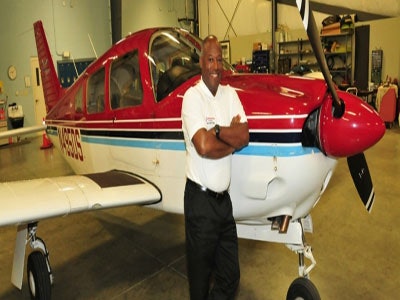Seventy-five minutes into a conversation with retired Army Lt. Col. Michael Hales, new director of the Delaware State University Aviation Department, he celebrates a student pilot’s first solo flight by pouring a 30-gallon trash can full of water over the student’s head.
“Normally, we cut the shirttail off a student after their first solo, but he was wearing his uniform shirt,” says Hales.
So, Hales improvised. He and the soaking-wet student pilot stand beaming in a large puddle of water. The moment is emblematic of the new direction the Aviation Department is taking. It is also a sign of the improvisational leadership style Hales employs to boost the department.
 Retired Army Lt. Col. Michael Hales is the director of the Delaware State University Aviation Department
Retired Army Lt. Col. Michael Hales is the director of the Delaware State University Aviation DepartmentThe student, Elias Stephens, a U.S. veteran, is part of the new breed of student pilots Hales is attracting to the Dover, Delaware-based university’s aviation program.
Delaware State has a proud aviation history, stretching back to the original Tuskegee Airmen project. In the late 1930s, six historically Black colleges, including DSU, took part in recruiting and screening potential Black pilots. After the United States entered WWII, the project was consolidated. Eligible pilots from all the schools were transferred to Tuskegee. The other five schools eventually suspended their programs.
DSU revived its program in 1987. Thirty years later, under the leadership of Hales, the program is poised to undergo its largest expansion ever.
“When I interviewed for this job, I presented a comprehensive plan,” he says.
The plan includes increasing student enrollment from the 100 currently enrolled to 500 in five years. “The airlines are desperate for pilots. We want to be a major conduit of highly qualified aviators for them,” says Hales.
He’s right. A combination of regulations and retirements means that the airlines need to hire thousands of pilots over the next decade. Delivering on that kind of promise will mean taking advantage of any logistical support opportunities.
DSU is a small aviation school when compared to mainstream aviation universities. Hales sees that as an advantage. “We can be nimble,” he says.
Increased enrollment comes from a viable plan to attract quality students. Attractive location is one part of that plan. Aviation classes are held at Delaware Airpark, minutes from the main campus. It’s the same airfield where the program was launched. Equipment access is another. Unlike many college-based aviation programs, DSU owns its own fleet of 10 airplanes.
“Some universities make you rent a plane for the airwork from a private company,” says Hales. “That could delay your training and progress. Owning our own planes eliminates those problems.”
Outreach is another. Through Hales’ outreach efforts, DSU and the U.S. Department of Veterans Affairs now work in partnership to train interested U.S. military veterans to become commercial pilots.
Another outreach effort is aimed at high school students. DSU gets some of its students directly through a middle and high school aviation program called ACE Academy. The ACE camp is co-sponsored by the Organization of Black Aerospace Professionals.
Those fortunate enough to attend get their first exposure to aviation, or their first taste of flight instruction, or even their first solo flight. “Many minority students are unaware of the possibility of an aviation career,” says Hales. “Through ACE camp, they meet pilots of all ethnicities and genders. That exposure inspires a handful to pursue an aviation career.”
Moreover, since their first exposure is at DSU, some naturally matriculate to DSU.
Hales has also invested much time cultivating connections with companies that hire freshly minted commercial pilots into their first professional jobs. Recent graduates of the DSU program fly for regional airlines such as CommutAir, Piedmont, PSA and Mesa. Hales also has established relationships with DSU alums flying at every major airline.
A national reputation also boosts enrollment. The DSU Flying Hornets are members of the National Intercollegiate Flying Association (NIFA). Last year, under Hales’ leadership, the Hornets medaled in three team events: Overall Flight Events (third place), Overall Ground Events (third place) and Overall SAFECON Championship (third place).
That’s a big deal. NIFA members include aviation behemoths such as Embry-Riddle, Purdue and Southern Illinois universities. Each of those programs boasts hundreds of pilots. DSU has fewer than a dozen currently qualified to compete.
If Hales’ plan sounds like it has all the elements of a business plan, it may be because the Aviation Department is part of DSU’s College of Business. That’s a departure from other programs that are usually in the school of science or technology. Hales reports directly to College of Business Dean Donna Covington.
“Michael’s credentials are impeccable. He has displayed exemplary leadership, building flight programs through the Army all around the world, and now here. We are very lucky to have him,” says Covington.
Michael demurs. “I give all the credit to Dean Covington. She understands that professional aviation is more a business than a science or technology. Thus, she gives me broad latitude to grow the program with that in mind.”
Ultimately, it is imperative that the program be diverse. In addition to African-American pilots, there are a number of female pilots, White and Hispanic pilots. In fact, the DSU student pilot group appears to reflect the reality of the current professional airline pilot population.
Moreover, DSU has sister school relationships with universities in at least two African nations. Hales is working on a plan to bring students to DSU from those universities through a flight-training exchange program.
Hales is even extending diversity to academics. Well aware of the need for many more airplane mechanics in the next decade, he has made plans to create an aviation maintenance management major.
Michael Hales’ flight plan seems to be on course. In just his first year as director, he has increased student enrollment by more than 22 percent. What a great way for the DSU Flying Hornets to soar into their 30th year.


















